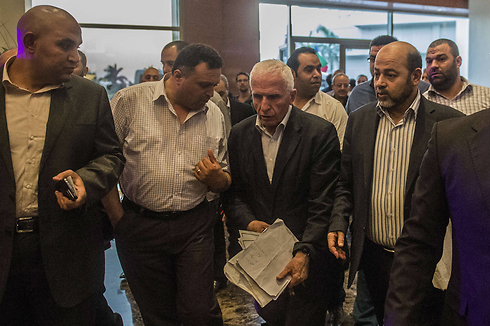Hamas political chief Khaled Mashal told Al Jazeera that the Gaza-based organization would not concede on its demands. In an interview with the Qatari news network, Mashal said, "We want all the crossings to open; we want our own seaport, our own airport, and our central demand – an end to the occupation and the settlement industry."
Mashal called on the international community during the interview to work towards lifting the blockade on Gaza. "We want our residents in Gaza to not feel the burden of the blockade and to live a normal life."
The Hamas chief, who is headquartered in Qatar, told the network that "we want to protect our citizens, not to use the blood of the residents for our position in the negotiations. We want our demands to be accepted, but Israel is biding time and ignoring them."
Hamas chief Khaled Mashal on Al Jazeera
At the same time, one of Mashal's close associates, senior Hamas official Izzat al-Risheq said Saturday that the organization has not agreed and will not agree to what was offered the Palestinian delegation before it left Cairo.
"We oppose any formulation that does not match the demands of the Palestinian people. There are many issues that the delegation did not agree to in what was offered," said al-Risheq, who represented Hamas in Cairo.
Al-Risheq's remarks joined earlier statements made by a senior Hamas official abroad, Ismail Radwan, who said Hamas refused to postpone deliberations on a seaport and airport – which according to the Egyptian proposal would not be discussed again until a month after an accord was signed.
Hamas' foreign leadership said Saturday evening that significant progress had yet to be achieved in the Cairo talks. "The draft presented this week by Egypt is not acceptable to us in any way, and it will not be the final formulation," Hamas said in a statement.
"We have many comments about what was offered there and we will not allow Israel to play us and drag us into discussions on peripheral and technical issues."
The statement emphasized that "what was achieved during the last round in Cairo is actually the first step – overcoming Israel's absolute rejection, which has so far tried to avoid the consequences of the destruction it wrought on the Gaza Strip; the work in the talks has not yet finished."
Attila Somfalvi contributed to this report.
















